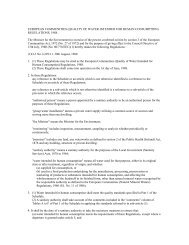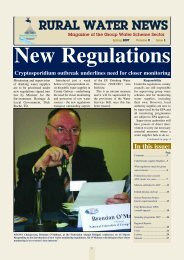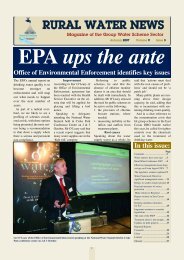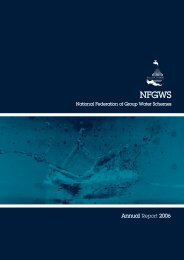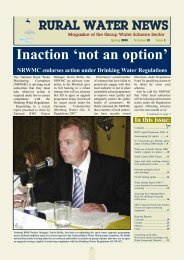Into the future
Autumn 2006 - nfgws
Autumn 2006 - nfgws
- No tags were found...
Create successful ePaper yourself
Turn your PDF publications into a flip-book with our unique Google optimized e-Paper software.
Rural Water News Autumn 2006<br />
Comment<br />
As our cover story suggests, <strong>the</strong> <strong>future</strong> management of group<br />
water schemes is an issue that must be addressed. While voluntary<br />
community control will remain our bedrock, <strong>the</strong>re is no<br />
escaping <strong>the</strong> fact that voluntarism generally is in decline. After<br />
full consideration of <strong>the</strong> new operating environment for<br />
schemes, <strong>the</strong> NFGWS Board is unequivocal in its assessment<br />
that we need to employ people with <strong>the</strong> necessary skills to take<br />
care of <strong>the</strong> day-to-day business of a modern water service. We<br />
should move now to employ paid management and staff, working<br />
under <strong>the</strong> direction of <strong>the</strong> GWS Board.<br />
***<br />
As <strong>the</strong> hot summer wea<strong>the</strong>r becomes an ever-distant memory,<br />
some of <strong>the</strong> issues that arose for water service providers during<br />
<strong>the</strong> long dry spell should nei<strong>the</strong>r be forgotten nor ignored.<br />
In particular, many public and private suppliers experienced a<br />
rapid and serious depletion of <strong>the</strong>ir raw water sources as consumption<br />
exploded and lakes and groundwater sources had<br />
difficulty recharging fast enough to meet <strong>the</strong> demand.<br />
And even in circumstances where sources had sufficient water,<br />
<strong>the</strong> exceptional demand meant that treatment plants were operating<br />
far beyond <strong>the</strong>ir design capacity.<br />
Perhaps this year was a flash in <strong>the</strong> pan and in nine months<br />
time we will return to our ‘traditional’ Irish summer, but as<br />
water service providers, we need to prepare for <strong>the</strong> worst case<br />
scenario and to vastly improve <strong>the</strong> management of water<br />
resources by recognising <strong>the</strong> limits of our sources and, where<br />
possible, eliminating water wastage.<br />
Both group water schemes and public schemes have to react<br />
more quickly in periods of drought and, where necessary,<br />
introduce bans on <strong>the</strong> use of hosepipes, car washes, domestic<br />
swimming pools and o<strong>the</strong>r non-essential uses of water.<br />
Consideration should also be given to interconnecting back-up<br />
sources to <strong>the</strong> main supply.<br />
These are issues that should not and can not be put on <strong>the</strong> long<br />
finger.<br />
***<br />
In this issue, we highlight <strong>the</strong> unscrupulous behaviour of some<br />
of those selling individual water treatment systems to households.<br />
As water service providers, we need to be vigilant.<br />
Where we see companies preying on our communities, we<br />
should document and highlight <strong>the</strong>ir activities and stress to our<br />
members <strong>the</strong> potential dangers of such systems. At present,<br />
massive public and GWS monies are being invested in ensuring<br />
a quality drinking water supply. We cannot allow <strong>the</strong>se companies<br />
to go unchallenged in undermining public confidence in<br />
our treated supplies. They should be challenged to scientifically<br />
prove <strong>the</strong> claims <strong>the</strong>y make – in o<strong>the</strong>r words put up or shut up.<br />
And until a law is introduced to deal with scare-mongering<br />
sales techniques, group schemes are urged to contact <strong>the</strong><br />
Federation with any information or concerns <strong>the</strong>y may have<br />
about <strong>the</strong> operation of such companies.<br />
Disclaimer<br />
While every care has been taken to ensure that <strong>the</strong> information<br />
contained in this publication is up to date and correct, no<br />
responsibility will be taken by <strong>the</strong> National Federation of<br />
Group Water Schemes for any error which might occur.<br />
Although grateful for <strong>the</strong> support of our advertisers, readers<br />
should note that inclusion of an advertisement does not imply<br />
any form of recommendation.<br />
We try to ensure <strong>the</strong> reliability of advertisers, but Rural<br />
Water News cannot accept liability for <strong>the</strong> quality of goods and<br />
services offered.<br />
3<br />
Water regulation imminent<br />
legislation to be enacted this term<br />
Delegates to this year’s<br />
Rural Water Services conferences<br />
in Sligo and Cavan<br />
were left in no doubt that<br />
<strong>the</strong> long-awaited Water<br />
Services Bill will be enacted<br />
in <strong>the</strong> coming term. And<br />
<strong>the</strong>re were firm indications<br />
from Environment Minister<br />
Dick Roche, TD, that introduction<br />
of <strong>the</strong> legislation<br />
will be followed by new,<br />
stringent regulations aimed<br />
at community-owned water<br />
service providers.<br />
Unsavoury<br />
Speaking at <strong>the</strong> official opening<br />
of DBO treatment plants<br />
across County Sligo on 20<br />
July, Minister Roche<br />
announced <strong>the</strong> introduction of<br />
what he termed ‘a new regulatory<br />
framework for <strong>the</strong><br />
group water scheme sector’.<br />
Warning that he would no<br />
longer tolerate situations<br />
where rural families are<br />
denied access to quality<br />
drinking water because of<br />
what he termed ‘intransigence<br />
or lack of initiative by local<br />
authorities or by group water<br />
schemes’, <strong>the</strong> Minister<br />
emphasised that an alternative<br />
was available to those<br />
facing sanctions. Pointing to<br />
<strong>the</strong> Sligo DBO bundle project<br />
as an example for o<strong>the</strong>rs to<br />
follow, he said:<br />
‘I have a strong preference<br />
for <strong>the</strong> carrot of adequate<br />
resourcing and support – as<br />
opposed to <strong>the</strong> stick of stringent<br />
legislation – to encourage<br />
group schemes to move<br />
in <strong>the</strong> right direction. Group<br />
schemes have nothing to<br />
fear from better regulation,<br />
while consumers have<br />
everything to gain. I guarantee<br />
that funding will not be a<br />
constraint on progress.’<br />
ACMI<br />
Solutions to Water Conservation<br />
ACMI is a Water Metering Service Provider.<br />
We are a company dedicated to providing cost<br />
effective products and services for <strong>the</strong><br />
enhancement of Water Conservation.<br />
We Design - Supply - Install and Commission<br />
• Automatic Meter Reading Systems<br />
• Meter Consumption Data Collection &<br />
Billing Services<br />
• Boundary Boxes and Meters<br />
• Group Scheme - Non Domestic and Industrial<br />
Water Metering Systems<br />
• Leakage Detection – Leak Location and Leak<br />
Repair Service<br />
• Pressure and Flow Surveys<br />
• Meter Calibration and Verification<br />
• Pressure Reducing Valves<br />
Unit 2, Ryebrook Business Park,<br />
Leixlip, Co Kildare<br />
Tel: 01 6244274 Fax: 01 6244953<br />
Email: info@acmi.ie



